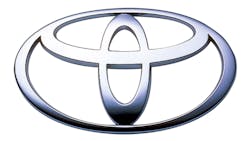LOS ANGELES -- In what the automaker hopes is a bellwether verdict for similar cases, a U.S. jury cleared Toyota (IW 1000/8) Thursday of liability for a 2009 fatal accident involving unintended acceleration.
Toyota, which still faces dozens of U.S. lawsuits alleging that defects caused cars to accelerate without their drivers wanting them to, welcomed the ruling after a two-month trial in Los Angeles.
Noriko Uno died on August 28, 2009, after her 2006 Camry collided with another vehicle and then lost control at speeds of up to 90 mph, before slamming into a tree.
In the LA trial, the first in a series of consolidated cases, the 66-year-old's family argued that Toyota failed to include a brake-override system that would have prevented the crash. But the LA Superior Court jury ruled in favor of the carmaker, whose lawyers argued that Uno had simply put her foot on the gas pedal instead of the brake.
U.S. Toyota spokeswoman Carly Schaffner said the company was "gratified" by the jury's decision that the design of the car "did not contribute to this unfortunate accident."
The verdict affirmed "the same conclusion we reached after more than three years of careful investigation -- that there was nothing wrong with the vehicle at issue in this case.
"As an important bellwether in these consolidated state proceedings, we believe this verdict sets a significant benchmark by helping further confirm that Toyota vehicles are safe with or without brake override," she added.
Lawyers for Uno's family had asked for $20 million in damages from Toyota.
While the jury cleared Toyota of any liability, it awarded the victim's family $10 million in damages from Olga Belo, the driver of a Lexus who ran a stop light and struck Uno's Camry, causing it to swerve and lose control.
Toyota lawyer Vincent Galvin told the jury during the trial: "This is a case of simple driver error -- pedal misapplication. ... This accident was not caused by the vehicle -- it was caused by the driver."
He also claimed that Uno was hypoglycemic, distracted by the first crash and short in stature -- all factors he said that could potentially cause misuse of the brake and gas pedals.
But Garo Mardirossian, lawyer for Uno's family, said she was in no way impaired at the time of the crash. "Her health was not an issue," the attorney said. "Her health had nothing to do with her driving."
Last December, Toyota said it had agreed to pay about $1.1 billion to settle a class action lawsuit launched by U.S. vehicle owners affected by a series of mass recalls from the automaker.
Toyota did not accept any blame but agreed to compensate owners who argued that the value of about 16.3 million vehicles took a hit from dozens of deadly accidents allegedly caused by Toyota vehicles speeding out of control in 2009.
The deal covered the cost of installing a free brake override system in about 2.7 million vehicles. It also provided cash payments to those who sold cars after the recalls or who owned vehicles ineligible for the override system.
Copyright Agence France-Presse, 2013
About the Author
Agence France-Presse
Copyright Agence France-Presse, 2002-2025. AFP text, photos, graphics and logos shall not be reproduced, published, broadcast, rewritten for broadcast or publication or redistributed directly or indirectly in any medium. AFP shall not be held liable for any delays, inaccuracies, errors or omissions in any AFP content, or for any actions taken in consequence.
